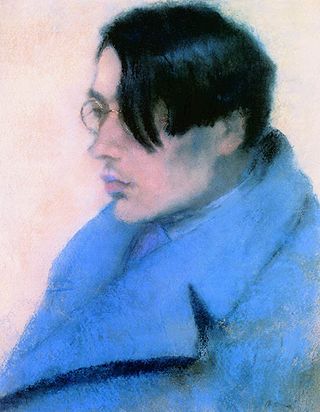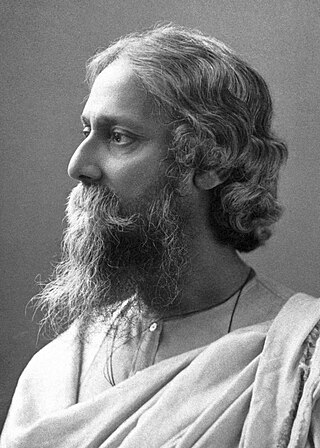
Stéphane Mallarmé, pen name of Étienne Mallarmé, was a French poet and critic. He was a major French symbolist poet, and his work anticipated and inspired several revolutionary artistic schools of the early 20th century, such as Cubism, Futurism, Dadaism, and Surrealism.

Symbolism was a late 19th-century art movement of French and Belgian origin in poetry and other arts seeking to represent absolute truths symbolically through language and metaphorical images, mainly as a reaction against naturalism and realism.

Stefan Anton George was a German symbolist poet and a translator of Dante Alighieri, William Shakespeare, Hesiod, and Charles Baudelaire. He is also known for his role as leader of the highly influential literary circle called the George-Kreis and for founding the literary magazine Blätter für die Kunst.
French poetry is a category of French literature. It may include Francophone poetry composed outside France and poetry written in other languages of France.

19th-century French literature concerns the developments in French literature during a dynamic period in French history that saw the rise of Democracy and the fitful end of Monarchy and Empire. The period covered spans the following political regimes: Napoleon Bonaparte's Consulate (1799–1804) and Empire (1804–1814), the Restoration under Louis XVIII and Charles X (1814–1830), the July Monarchy under Louis Philippe d'Orléans (1830–1848), the Second Republic (1848–1852), the Second Empire under Napoleon III (1852–1871), and the first decades of the Third Republic (1871–1940).

Lőrinc Szabó de Gáborján was a Hungarian poet and literary translator.

Bengali literature denotes the body of writings in the Bengali language and which covers Old Bengali, Middle Bengali and Modern Bengali with the changes through the passage of time and dynastic patronization or non-patronization. Bengali has developed over the course of roughly 1,400 years. If the emergence of the Bengali literature supposes to date back to roughly 650 AD, the development of Bengali literature claims to be 1600 years old. The earliest extant work in Bengali literature is the Charyapada, a collection of Buddhist mystic songs in Old Bengali dating back to the 10th and 11th centuries. The timeline of Bengali literature is divided into three periods: ancient (650–1200), medieval (1200–1800) and modern. Medieval Bengali literature consists of various poetic genres, including Hindu religious scriptures, Islamic epics, Vaishnava texts, translations of Arabic, Persian and Sanskrit texts, and secular texts by Muslim poets. Novels were introduced in the mid-19th century. Nobel laureate Rabindranath Tagore is the best known figure of Bengali literature to the world. Kazi Nazrul Islam, notable for his activism and anti-British literature, was described as the Rebel Poet and is now recognised as the National poet of Bangladesh.

Rabindranath Thakur was an Indian polymath who worked as a poet, writer, playwright, composer, philosopher, social reformer, and painter of the Bengal Renaissance. He reshaped Bengali literature and music as well as Indian art with Contextual Modernism in the late 19th and early 20th centuries. Author of the "profoundly sensitive, fresh and beautiful" poetry of Gitanjali. In 1913, Tagore became the first non-European (non-White) and the first Asian to win a Nobel Prize in any category, and also the first lyricist to win the Nobel Prize in Literature. Tagore's poetic songs were viewed as spiritual and mercurial; where his elegant prose and magical poetry were widely popular in the Indian subcontinent. He was a fellow of the Royal Asiatic Society. Referred to as "the Bard of Bengal", Tagore was known by the sobriquets Gurudeb, Kobiguru, and Biswokobi.

The Decadent movement was a late 19th-century artistic and literary movement, centered in Western Europe, that followed an aesthetic ideology of excess and artificiality.

Buddhadeva Bose, also spelt Buddhadeb Bosu, was an Indian Bengali writer of the 20th century. Frequently referred to as a poet, he was a versatile writer who wrote novels, short stories, plays and essays in addition to poetry. He was an influential critic and editor of his time. He is recognised as one of the five poets who moved to introduce modernity into Bengali poetry. It is said that since Rabindranath Tagore, there has not been a more versatile talent in Bengali literature.
Nationality words link to articles with information on the nation's poetry or literature.
Lamberto E. Antonio was a Filipino writer from Cabiao, Nueva Ecija.

Joe Winter is a British poet, literary critic and translator of poetry. A recent long poem is At the Tate Modern. His translations of the Bengali poets Rabindranath Tagore and Jibanananda Das are published by Carcanet Press, and his versions in modern English of the Anglo-Saxon epic Beowulf and the Middle English poem Pearl are with Sussex Academic Press. SAP has also published Two Loves I Have: a new reading of Shakespeare’s Sonnets and Hide Fox, and All After: What lies concealed in Shakespeare's 'Hamlet'?

Song Offerings is a volume of lyrics by Bengali poet Rabindranath Tagore, rendered into English by the poet himself, for which he was awarded the 1913 Nobel Prize in Literature.

For Anatole's Tomb is an unfinished poem by the French writer Stéphane Mallarmé. It is also known as A Tomb for Anatole. It was written after the death of Mallarmé's son Anatole. The finished fragments were published in 1961.

Charlotte Endymion Porter was an American poet, translator, and literary critic and the cofounder and coeditor of the journal Poet Lore. As the editor or coeditor of editions of the complete works of William Shakespeare, Robert Browning, and Elizabeth Barrett Browning, and as a translator of major writers from around the world for Poet Lore, she was influential in shaping the American literary taste of her day.
Helen Archibald Clarke was an American literary critic, book editor, composer and lyricist, and the co-founder of the journal Poet Lore. She was influential in shaping the American literary taste of her day through her work on Poet Lore, through her work co-editing the complete works of the British poets Robert Browning and Elizabeth Barrett Browning, and through her books on writers such as Nathaniel Hawthorne and Henry Wadsworth Longfellow.
Zinaida Alexandrovna Mirkina was a Russian essayist, translator and philosopher. She was an awardee of the Bjørnson Prize of the Norwegian Academy of Literature and Freedom of Expression for "extensive contribution to strengthening the freedom of expression in Russia."













